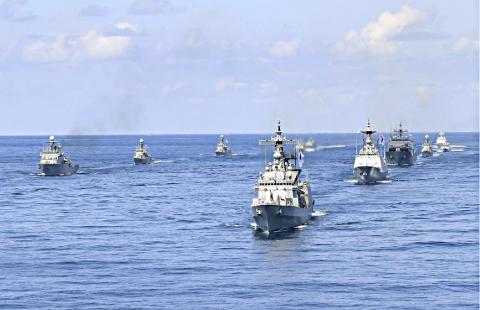South Korean forces yesterday began two days of expanded drills around an island also claimed by Japan, prompting a protest from Tokyo only days after Seoul said it would scrap an intelligence-sharing pact with its neighbor amid worsening relations.
Tokyo and Seoul have long been at loggerheads over the sovereignty of the group of islets called Takeshima in Japanese and Dokdo in Korean, which lie about halfway between the East Asian neighbors in the Sea of Japan, which South Korea insists should be called the East Sea.
The latest military drills included naval, air, and army forces, as well as marines, a South Korean Ministry of Defense official said.

Photo: EPA-EFE / South Korea Navy handout
The Japanese Ministry of Foreign Affairs called the drills “absolutely unacceptable” and said it had lodged a protest with South Korea calling for them to end.
The island is “obviously an inherent part of the territory of Japan,” Asian and Oceanian Affairs Bureau Director-General Kenji Kanasugi told the South Korean embassy in Tokyo in a statement.
Ko Min-jung, a spokeswoman for South Korea’s presidential Blue House, said the drill was an annual exercise and not aimed at any specific country.
“It’s an exercise to guard our sovereignty and territory,” she told reporters in Seoul.
The exercise included significantly more South Korean forces than previously involved and spanned a wider area in the sea between South Korea and Japan, a South Korean navy official said.
For the first time the drills included an Aegis-equipped destroyer and army special forces, the official said, speaking on condition of anonymity because of the sensitivity of the issue.
The disputed islands have long been one of the most sensitive areas of contention between Japan and South Korea.
A detachment of South Korean guards has been stationed there since the 1950s and South Korea has conducted annual defense drills in the area.
Tokyo accuses South Korea of occupying the islands illegally.
The South Korean Navy said the drills were designed to underscore its commitment to defending the broader area.
“The military has changed the name of the drills to ‘East Sea Territorial Protection Exercise’ reflecting the scale and meaning of the drills to solidify the military’s resolve to protect the territory in the East Sea,” the navy said in a statement.
Previous drills had been called the “Dokdo Defense Exercise.”
Additional reporting by AFP

ENDEAVOR MANTA: The ship is programmed to automatically return to its designated home port and would self-destruct if seized by another party The Endeavor Manta, Taiwan’s first military-specification uncrewed surface vehicle (USV) tailor-made to operate in the Taiwan Strait in a bid to bolster the nation’s asymmetric combat capabilities made its first appearance at Kaohsiung’s Singda Harbor yesterday. Taking inspiration from Ukraine’s navy, which is using USVs to force Russia’s Black Sea fleet to take shelter within its own ports, CSBC Taiwan (台灣國際造船) established a research and development unit on USVs last year, CSBC chairman Huang Cheng-hung (黃正弘) said. With the exception of the satellite guidance system and the outboard motors — which were purchased from foreign companies that were not affiliated with Chinese-funded

PERMIT REVOKED: The influencer at a news conference said the National Immigration Agency was infringing on human rights and persecuting Chinese spouses Chinese influencer “Yaya in Taiwan” (亞亞在台灣) yesterday evening voluntarily left Taiwan, despite saying yesterday morning that she had “no intention” of leaving after her residence permit was revoked over her comments on Taiwan being “unified” with China by military force. The Ministry of the Interior yesterday had said that it could forcibly deport the influencer at midnight, but was considering taking a more flexible approach and beginning procedures this morning. The influencer, whose given name is Liu Zhenya (劉振亞), departed on a 8:45pm flight from Taipei International Airport (Songshan airport) to Fuzhou, China. Liu held a news conference at the airport at 7pm,

GRIDLOCK: The National Fire Agency’s Special Search and Rescue team is on standby to travel to the countries to help out with the rescue effort A powerful earthquake rocked Myanmar and neighboring Thailand yesterday, killing at least three people in Bangkok and burying dozens when a high-rise building under construction collapsed. Footage shared on social media from Myanmar’s second-largest city showed widespread destruction, raising fears that many were trapped under the rubble or killed. The magnitude 7.7 earthquake, with an epicenter near Mandalay in Myanmar, struck at midday and was followed by a strong magnitude 6.4 aftershock. The extent of death, injury and destruction — especially in Myanmar, which is embroiled in a civil war and where information is tightly controlled at the best of times —

Taiwan was ranked the fourth-safest country in the world with a score of 82.9, trailing only Andorra, the United Arab Emirates and Qatar in Numbeo’s Safety Index by Country report. Taiwan’s score improved by 0.1 points compared with last year’s mid-year report, which had Taiwan fourth with a score of 82.8. However, both scores were lower than in last year’s first review, when Taiwan scored 83.3, and are a long way from when Taiwan was named the second-safest country in the world in 2021, scoring 84.8. Taiwan ranked higher than Singapore in ninth with a score of 77.4 and Japan in 10th with